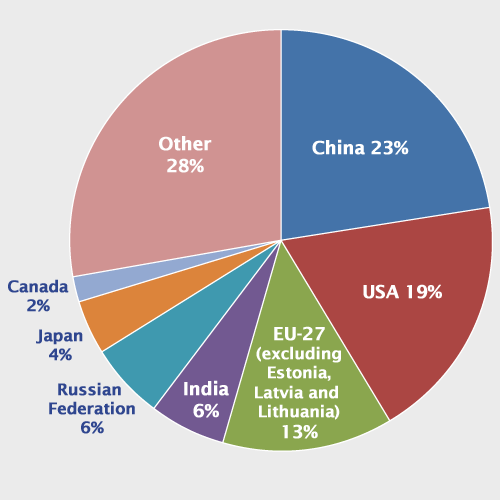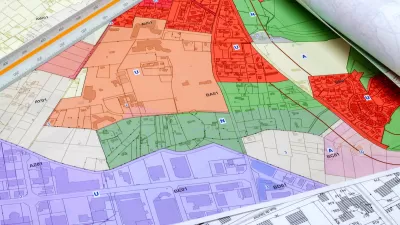A surprise, groundbreaking agreement between China and the United States was unveiled in Beijing at the end of the APEC conference, providing hope that the world can reduce the threat from climate change.
According to the agreement between Chinese President Xi Jinping and President Obama, the United States will reduce "its emissions by 26 percent - 28 percent below its 2005 level in 2025 (and) China intends to achieve the peaking of CO2 emissions around 2030," writes Bill Chappell of NPR's the Two-Way on the landmark agreement reached between the world's top-two carbon emitters.

2008 Global CO2 Emissions from Fossil Fuel Combustion and some Industrial Processes (million metric tons of CO2). Credit: EPA; source: National CO2 Emissions from Fossil-Fuel Burning, Cement Manufacture, and Gas Flaring: 1751-2008.
China has also agreed "to make best efforts to peak early and intends to increase the share of non-fossil fuels in primary energy consumption to around 20 percent by 2030," adds Chappell.
The two leaders' pledges are being called dramatic and ambitious — for the U.S., because Obama's earlier plans had called for a smaller cut in emissions, and for China, because the country had previously resisted calls for it to consider capping its emissions as it grows and modernizes.
An agreement is unlike a climate treaty that would have to be ratified by the U.S. Senate. In addition, "(t)he White House thinks the U.S. can meet these targets without new legislation," says NPR's Scott Horsley, reporting from Beijing for Morning Edition. "That's important, because after last week's midterm elections, we're not likely to see any new climate legislation coming out of Capitol Hill."
I might add that with climate change denier Sen. James Inhofe (R-Ok.) taking the place of Sen. Barbara Boxer (D-Calif.) as chairman of the Environment and Public Works Committee, you can count on that.
FULL STORY: China And U.S., Titans Of Carbon Pollution, Move To Cut Gases

Planetizen Federal Action Tracker
A weekly monitor of how Trump’s orders and actions are impacting planners and planning in America.

Restaurant Patios Were a Pandemic Win — Why Were They so Hard to Keep?
Social distancing requirements and changes in travel patterns prompted cities to pilot new uses for street and sidewalk space. Then it got complicated.

Map: Where Senate Republicans Want to Sell Your Public Lands
For public land advocates, the Senate Republicans’ proposal to sell millions of acres of public land in the West is “the biggest fight of their careers.”

Maui's Vacation Rental Debate Turns Ugly
Verbal attacks, misinformation campaigns and fistfights plague a high-stakes debate to convert thousands of vacation rentals into long-term housing.

San Francisco Suspends Traffic Calming Amidst Record Deaths
Citing “a challenging fiscal landscape,” the city will cease the program on the heels of 42 traffic deaths, including 24 pedestrians.

California Homeless Arrests, Citations Spike After Ruling
An investigation reveals that anti-homeless actions increased up to 500% after Grants Pass v. Johnson — even in cities claiming no policy change.
Urban Design for Planners 1: Software Tools
This six-course series explores essential urban design concepts using open source software and equips planners with the tools they need to participate fully in the urban design process.
Planning for Universal Design
Learn the tools for implementing Universal Design in planning regulations.
Heyer Gruel & Associates PA
JM Goldson LLC
Custer County Colorado
City of Camden Redevelopment Agency
City of Astoria
Transportation Research & Education Center (TREC) at Portland State University
Camden Redevelopment Agency
City of Claremont
Municipality of Princeton (NJ)



























